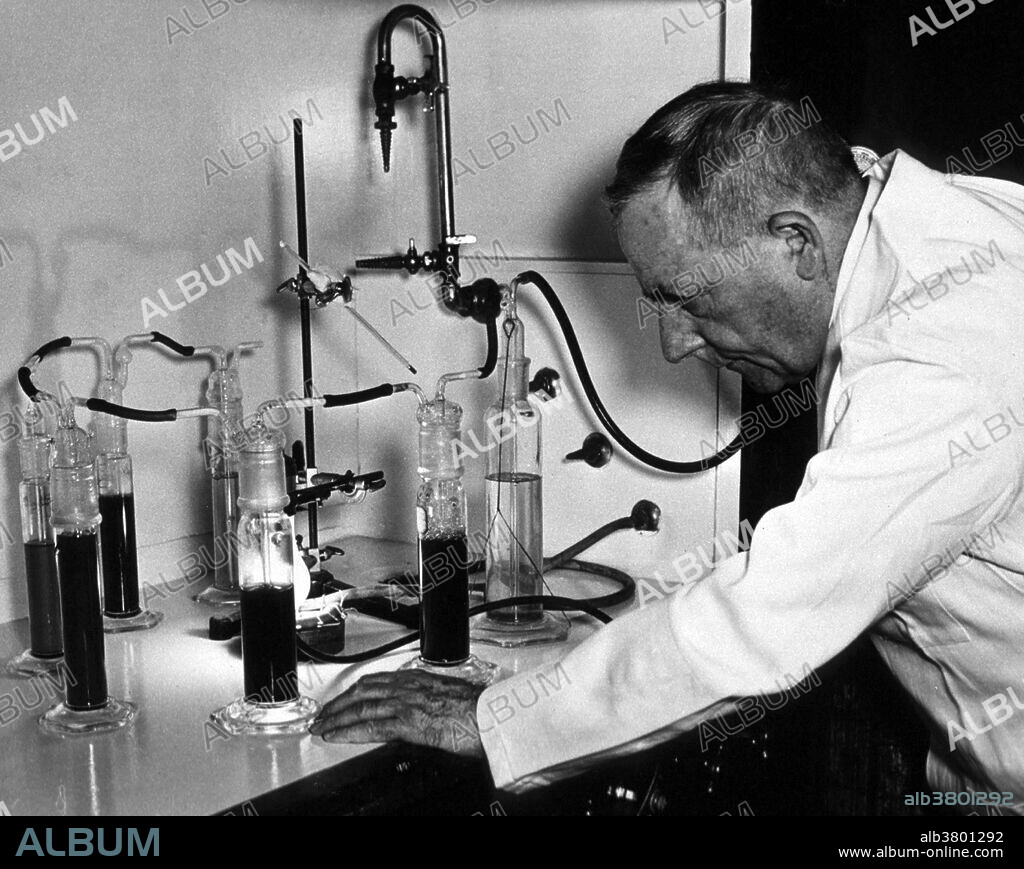alb3801292
Otto Heinrich Warburg, German Physiologist

|
Add to another lightbox |
|
Add to another lightbox |



Buy this image.
Select the use:

Title:
Otto Heinrich Warburg, German Physiologist
Caption:
Warburg in laboratory wearing lab cot next to the Warburg manometer used for studying enzyme reactions in which a gas is taken up or given off. No date or location given. Otto Heinrich Warburg (1883-1970) was a German physician and physiologist. He served as an officer in the elite Uhlans (cavalry) on the front during the First World War where he won the Iron Cross. Towards the end of the war Albert Einstein wrote Warburg asking him to leave the army and return to academia. In 1918 Warburg was appointed Professor at the Kaiser Wilhelm Institute for Biology and later named Director of the Kaiser Wilhelm Institute for Cell Physiology. Warburg investigated the metabolism of tumors and the respiration of cells, particularly cancer cells, and in 1931 was awarded the Nobel Prize in Physiology for his "discovery of the nature and mode of action of the respiratory enzyme." In 1944, he was nominated for a second Nobel Prize in Physiology for his work on nicotinamide, the mechanism and enzymes involved in fermentation, and the discovery of flavine, but he did not win. In his later years Warburg was convinced that illness resulted from pollution and became a health advocate. He died in 1970 at the age go 86.
Category:
Science: Personalities
Credit:
Album / NLM/Science Source
Releases:
Image size:
3600 x 2867 px | 29.5 MB
Print size:
30.5 x 24.3 cm | 12.0 x 9.6 in (300 dpi)
Keywords:
1883 • 1919 • 1931 • 1944 • 1970 • BW • CELEBRITIES • CELEBRITY • DISCOVERED FLAVINE • DISCOVERER • EUROPEA • EUROPEAN • EUROPEANS • EXPLORER • FAMOUS PEOPLE • FAMOUS • FIGURE • GERMAN • GERMANS • HEALTH ADVOCATE • HISTORIC • HISTORICAL DOCTOR • HISTORICAL PHYSICIAN • HISTORICAL • HISTORY • IMPORTANT • INVESTGATED CANCER CELLS • INVESTIGATED THE METABOLISM OF TUMORS • INVESTIGATED THE RESPIRATION OF CELLS • LAB COAT • LAB • LABCOAT • LABORATORIO • LABORATORY • LABORATORY; LAB • MALE • MAN • MANOMETER • MEDICAL • MEDICINAL • MEN • NOBEL LAUREATE • NOBEL PRIZE LAUREATE • NOBEL PRIZE RECIPIENT • NOBEL PRIZE WINNER • NOBEL PRIZE • NOBEL RECIPIENT • NOBEL WINNER • NOBEL • NOBELIST • NOTABLE • O. H. WARBURG • O. WARBURG • OTTO H. WARBURG • OTTO HEINRICH WARBURG • OTTO WARBURG • PATHOGENESIS OF CANCER • PEOPLE • PERSON • PERSONALITIES • PERSONALITY • PHOTO • PHOTOGRAPH • PHYSIOLOGIE • PHYSIOLOGIST • PHYSIOLOGY • PORTAIT • PORTRAIT • POTRAIT • PROFESSOR • RESEARCHER (MALE) • RESEARCHER • RESPIRATORY ENZYME • SCIENCE • SCIENCE: PERSONALITIES • STUDYING ENZYME REACTIONS • WARBURG MANOMETER • WARBURG • WELL-KNOWN • WON IRON CROSS
 Pinterest
Pinterest Twitter
Twitter Facebook
Facebook Copy link
Copy link Email
Email
